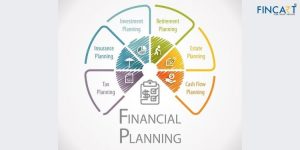Financial planning is a comprehensive, goal-oriented process that helps you manage your resources efficiently to achieve financial stability and success. It covers everything from budgeting and investing to tax planning, debt management, and risk protection. Whether you handle your finances independently or with the help of a professional, financial planning ensures you’re equipped to handle both expected and unexpected financial situations.
It also forms the foundation of personal finance and planning, empowering individuals to make informed decisions through financial advisors. Importantly, financial planning involves setting both long-term and financial planning short term goals—like building an emergency fund, saving for a vacation, or repaying a short-term loan—ensuring balanced progress across different stages of life.
Let’s explore why financial planning is important today and examine the top ten benefits of integrating it into your life.
Why Is Financial Planning Important?
With rising costs and complex financial products, having a financial plan is more important than ever. Financial planning in India enables individuals to:
- Combat inflation through wise investment strategies.
- Maintain spending discipline amid lifestyle inflation.
- Prepare for emergencies with risk management tools.
- Save and invest in short-term and long-term financial goals.
In short, personal finance and planning helps you make informed choices, reduce stress around money, and work confidently toward your future aspirations.
Top 10 Benefits of Financial Planning
1. Goal Clarity
A structured financial plan helps you define, prioritise, and track your goals—whether it’s owning a house, starting a business, or planning for your child’s education.
Using SMART goals (Specific, Measurable, Attainable, Relevant, and Time-bound) helps you stay aligned with your objectives.
2. Budgeting and Savings Discipline
Your financial goals define the what, and budgeting defines the how. A solid budget helps you:
- Track income and expenses.
- Ensure you’re living within your means.
- Allocate resources for savings and investment.
The 50/30/20 rule is a simple yet effective framework to categorise expenses and prioritise savings—making financial planning more approachable.
- 50% of your income should be allocated to essential expenses. These are also called ‘needs’, as they include necessities such as rent or mortgage, electricity and water bills, groceries, transportation, insurance premiums, and healthcare. Basically, if you can’t do without something or its absence seriously hurts your lifestyle, it can be considered an essential expense.
- 30% of your income can be used towards non-essential expenses such as dining out, steaming services, hobbies, and travel. These expenses are called ‘wants’, and they allow you to enjoy your life.
- 20% of your income should be dedicated to building your savings and paying off debts. Traditionally, savings were thought of as whatever income that’s left after all expenses are paid, but financial planning encourages prioritising savings just like any other essential expense. By simply setting aside this portion of your income first, you can make sure that you’re consistently working towards building a more financially secure future.
3. Debt Management
Effective financial planning helps you control and eventually eliminate debt. By using methods like the debt snowball or debt avalanche, you can reduce high-interest liabilities and regain financial independence.
Moreover, proper planning helps you avoid falling back into debt by integrating responsible borrowing into your broader personal financial strategy.
Debt snowball method
With this method, you start off by focusing on your smallest debts first. In the meantime, you can make minimum payments on your larger debts. Once a small debt is paid off, you can move on to the next smallest amount, then the smallest after, and so on. This is how this method gets its name. As you gain momentum and motivation with each paid-off debt, your ability to take on the larger debts increases, and a snowball effect is created.
Debt avalanche method
This method takes a different approach by focusing on paying off debts with the highest interest rates first while making minimum payments on debts with lower interests. When you concentrate on high-interest debts first, over time it helps you save more money, as the interest paid during the period is lower.
4. Risk Management and Emergency Preparedness
Financial risks are inevitable. With risk management as a pillar of your financial plan, you can stay prepared for the unknown.
- Health insurance reduces the financial impact of medical emergencies.
- Life insurance secures your family’s future.
- An emergency fund keeps your long-term goals on track during short-term setbacks.
5. Investment Planning
To grow your wealth, saving alone isn’t enough—you must invest. A well-constructed investment strategy:
- Matches your risk profile (conservative, moderate, aggressive).
- Leverages instruments like mutual funds, fixed deposits, or stocks.
- Emphasises diversification to manage risk.
- Includes regular portfolio reviews and rebalancing.
This structured approach to investment is at the core of effective financial planning and forecasting.
6. Tax Efficiency
A good financial plan includes smart tax planning, enabling you to retain more of your income legally. It includes:
- Investments in tax-saving instruments like ELSS, PPF, or NPS.
- Deductions on education/home loans under Sections 80C, 24(b), and 80E.
- Health and life insurance tax benefits under Sections 80D and 80C.
- Structuring your salary to maximise exemptions (like HRA and LTA).
- Donations to eligible charities for deductions under Section 80G.
Efficient tax planner ensures your wealth grows faster.
7. Financial Planning for Retirement in India
Retirement planning is one of the most vital aspects of your financial strategy. Without proper planning, many people find themselves financially insecure in their later years.
To avoid this, start saving and investing early. Consider equity-based instruments for long-term growth and use tools like NPS or retirement mutual funds to build your retirement corpus.
Starting early allows the power of compounding to work in your favour—leading to a worry-free retirement.
8. Education Funding
As the cost of education rises, especially for higher studies in India and abroad, planning early for your child’s education ensures you won’t have to rely heavily on loans or sacrifice other financial goals.
Systematic investing in child-specific plans, mutual funds, or Sukanya Samriddhi Yojana (for daughters) can help you meet this significant financial goal without stress.
9. Estate Planning
Estate or legacy planning ensures your wealth is transferred smoothly to your heirs. With tools like wills, nominations, and trusts, you can avoid disputes and preserve your family’s financial well-being.
This process is especially crucial in India where many people overlook formal succession planning.
10. Financial Security and Peace of Mind
Perhaps the most underappreciated benefit of financial planning is the peace of mind it offers. When you’ve accounted for emergencies, invested for growth, protected your family, and minimised taxes, you feel confident in your financial decisions.
You’re not just surviving—you’re thriving.
Additional Aspects of Financial Planning You Should Know
While traditional financial planning covers core areas like budgeting, investments, and retirement, there are several emerging and situational aspects that can enhance your planning process further—especially in the Indian context. Let’s explore some of them:
1. Financial Planning for Freelancers and Gig Workers
In today’s digital age, many professionals work as freelancers, consultants, or gig workers. Their income tends to be irregular, which brings unique financial planning challenges.
Key financial planning strategies for freelancers include:
- Creating a fluctuating income buffer: Aim to maintain a reserve fund equivalent to 6–9 months of average monthly income.
- Separating personal and business finances: Use dedicated accounts to track professional expenses, tax obligations, and business income.
- Tax planning for irregular income: Freelancers often need to pay advance tax every quarter and claim deductions under Sections 80C, 80D, and 10(14).
- Investing in insurance independently: Without employer benefits, freelancers must purchase their own health and life insurance policies.
2. Inflation-Adjusted Financial Planning
Many people underestimate the long-term impact of inflation. A goal that costs ₹10 lakhs today may require ₹25–30 lakhs in 15 years.
To factor in inflation:
- Use real return calculations instead of nominal returns when evaluating investments.
- Review and upgrade your insurance policies and emergency fund size every few years.
- Revisit long-term goals periodically and revise them upward as inflation rises.
This approach ensures your wealth doesn’t lose value over time.
3. Behavioral Finance and Emotional Decisions
Financial planning isn’t just numbers—human behavior plays a massive role. Emotional spending, fear-driven decisions during market volatility, or overconfidence can derail your goals.
Tips to stay on track:
- Automate savings and investments so that emotions don’t impact consistency.
- Create goal-based reminders to resist impulsive purchases or unnecessary withdrawals.
Practice periodic financial mindfulness, reflecting on why a goal matters rather than just tracking numbers.
Looking for a Financial Advisor?
Connect with Fincart for personalized financial advisory services and achieve your financial goals with confidence.
Conclusion
A well-structured financial plan does more than track money—it aligns your finances with your life goals. From budgeting and debt management to tax planning and retirement readiness, the benefits are extensive and impactful.
Whether you want to understand how to achieve financial goals, build a personal finance and planning routine, or engage in financial planning for retirement in India, starting early is key. Your future self will thank you.




